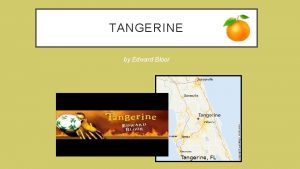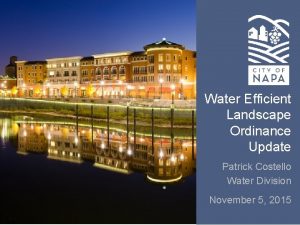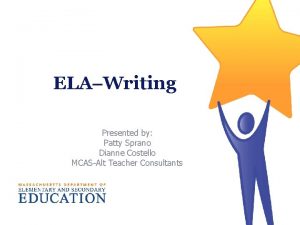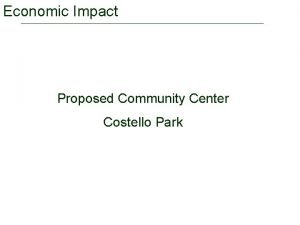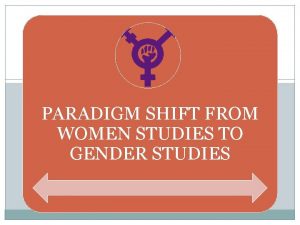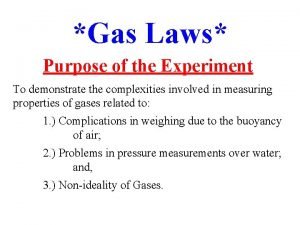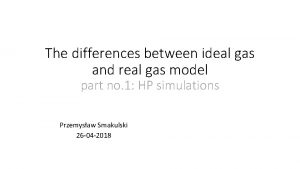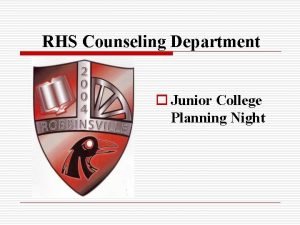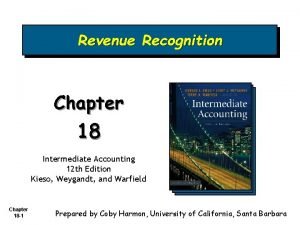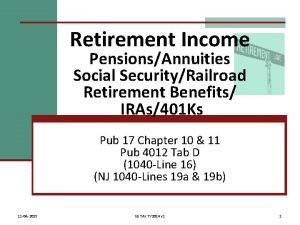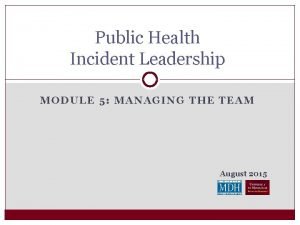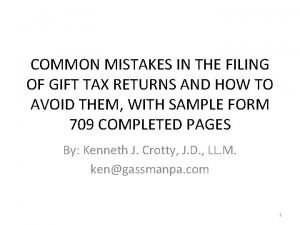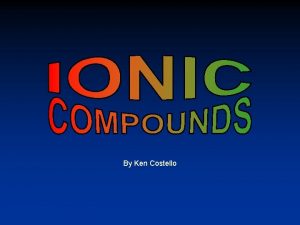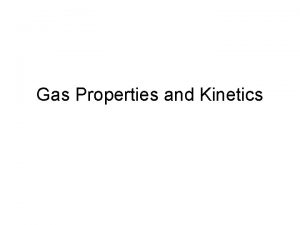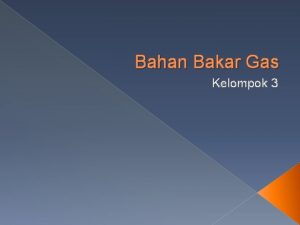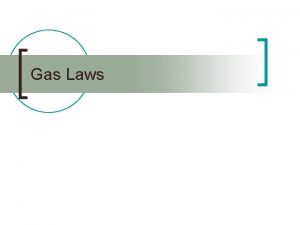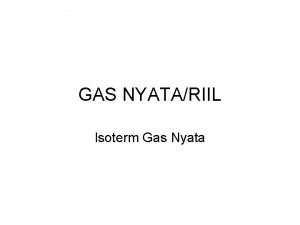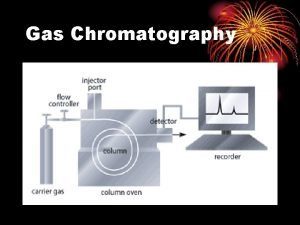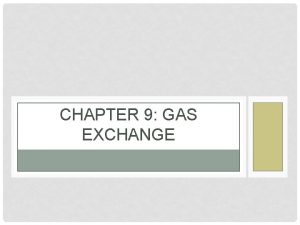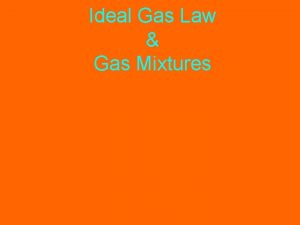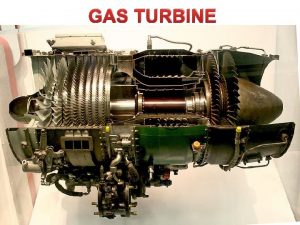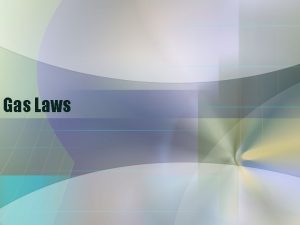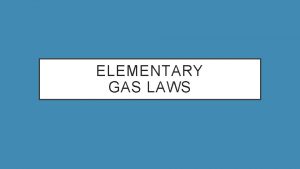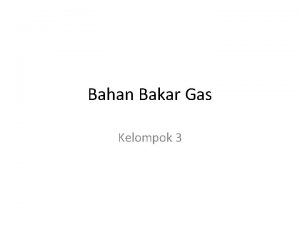NRRI Completed and Proposed Gas Studies Ken Costello


























- Slides: 26

NRRI Completed and Proposed Gas Studies Ken Costello National Regulatory Research Institute NARUC Subcommittee on Gas July 22, 2012

Completed Studies • Gas pipeline safety (May 2012) • Compensation to customers for service interruptions (July 2012) • Survey on long-term gas contracting and hedging (July 2012) NRRI July 22. 2012 2

Balancing Natural Gas Pipeline Safety With Economic Goals • The job of state utility commissions is to assure the public that utilities perform well in various dimensions, including economic efficiency, reliability, and safety. • Safety is a prominent goal, but only one of several goals that commissions attempt to advance. • Because sometimes these goals conflict, commissions need to weigh their relative importance and make trade-offs that best serve the public interest. NRRI July 22. 2012 3

Gas Pipeline Safety � continued • State utility regulators are committed to pipeline safety, in many instances going beyond federal regulations. • Regulators need to make assure that utilities spend that money wisely. • Good utility regulation requires balancing safety with other objectives, including just and reasonable rates. • The fundamental economic criterion for evaluating any safety-improving activity is whether it increases social net benefits. • Federal regulations required utilities to begin developing a distribution integrity management program (DIMP) by August 2, 2011. NRRI July 22. 2012 4

Gas Pipeline Safety � continued • Criticisms that a single agency is regulating both utility rates and safety overlook the importance and difficulty of balancing societal objectives. • The socially optimal level of safety is less than “perfect. ” • Gas utilities can overspend on safety from a societal perspective. • State utility regulators should evaluate carefully accelerated pipeline replacement. • A major determinant of the optimal level of safety is society’s risk aversion toward incidents. • A utility’s incentive for safety depends on several factors. NRRI July 22. 2012 5

Compensation to Customers for Service Interruptions • In the aftermath of prolonged power outages in 2011, state utility commissions, legislatures and governors have acted to hold utilities more accountable to their customers. • One regulatory policy that has received increased attention, and is the focus of the paper, is utility compensation of customers who experienced a service interruption. • The public-policy question addressed in this paper is whether customers who experienced an outage should receive compensation to reflect, at least in part, damages or inconveniences they suffered because of an outage. NRRI July 22. 2012 6

Compensation �continued • A fundamental economic question related to utility compensation is: Who can best minimize outage costs and who can best absorb the risk of outages, the insurance company, the victim, customers as a group, or utility shareholders? – The widely recognized Coase theorem tells us that liability should fall on those parties who can eliminate or mitigate a problem most cheaply. A desirable outcome is an efficient allocation of risk. – This solution, however, evades the question of who should bear the risk from a fairness perspective. NRRI July 22. 2012 7

Compensation • The merits of compensation come down to its perceived fairness and effect on the behavior of both utilities and customers. – Compensation when funded by utility shareholders can strengthen a utility’s incentive to avoid service interruptions with potentially high costs. – It also seems fair at first sight for the utility to reimburse customers for damages, especially when caused by a preventable outage. �continued – On the other hand, compensation may be inferior, from both a fairness and efficiency perspective, compared with: NRRI July 22. 2012 • Self-protection for which the customer spends money to mitigate the effects of a service interruption by buying a surge protector or special insurance, for example, or • Higher system reliability willingly paid for by customers. 8

Compensation �continued • This paper recognizes that most commissions do not require or even condone compensation. Exceptions include California, Illinois, Michigan, Minnesota and New York. • It advises state commissions to revisit their current policies on utility reliability to ensure that: – The public knows that utilities are held accountable for inferior performance – Regulatory incentives for utility service align customer reliability with utility economic interests – Efficient outcomes occur, and – Utility customers and shareholders receive fair treatment NRRI July 22. 2012 9

Survey on Long-Term Gas Contracting and Hedging • Both gas producers and utilities have expressed interest in long-term commercial arrangements. • Gas producers may: (1) view long-term contracting as a way to stabilize their cash flow and revenues and (2) also see less risk from a bearish outlook in which market prices are less likely to soar far above a contracted price. • Another factor supporting long-term contracts is the reluctance of some gas buyers to commit to investments that require the purchase of natural gas over a multi-year period unless offered a certain level of price and supply stability. NRRI July 22. 2012 10

Survey on Long-Term Contracting �continued • This survey report, funded by ANGA, contains the responses of thirty-five state utility commissions reflecting their policies and practices as they relate to long-term gas contracting, hedging and related matters. • The survey results show that the vast majority of utility commissions give utilities little guidance. • A plurality of them said that they would entertain long-term contracts if the utility can demonstrate that they: (1) are in the public interest or (2) fit optimally in its gas portfolio strategy. NRRI July 22. 2012 11

Survey on Long-Term Contracting �continued • The survey responses showed that few commissions have an explicit policy on long-term gas contracting. – Commissions typically evaluate a proposed long-term contract on a case-by-case basis. – Most commissions, in other words, are non-committal by not either outright restricting or encouraging longterm contracts. NRRI July 22. 2012 12

Survey on Long-Term Contracting �continued • Some industry observers contend that unless state commissions become more proactive in promoting long-term contracting, utilities will continue to rely heavily on financial hedging and other mechanisms to reduce price and supply risks. – There is an obvious lack of interest so far by gas utilities to propose long-term physical gas contracts before their commissions. – One conceivable reason is that utilities see little economic gains relative to the risks. That is, utilities consider long-term contracts to carry an unfavorable reward-risk imbalance. NRRI July 22. 2012 13

Survey on Long-Term Contracting �continued • Three states, Colorado, Oklahoma and Oregon, have departed from the norm by taking proactive roles in encouraging long-term gas contracting. – The Colorado and Oregon utility commissions found that long-term commercial arrangements could produce large benefits to utility customers in the long run. – The three-state efforts can offer guidance to other states who want to consider long-term contracting as a potential low-cost hedge benefiting utility customers over time. One key element of a long-term contracting policy is the certainty for cost recovery by a utility. NRRI July 22. 2012 14

New NRRI Gas Projects • LNG exports • The challenges from growing use of natural gas for electricity generation NRRI July 22. 2012 15

LNG Exports: What State Utility Commissions Should Know • Gas producers, exporters and other industry providers are seeking ways to increase demand for natural gas because of its abundance. • Currently, a large gap exists between domestic and foreign gas prices, creating attractive “arbitrage” opportunities, especially in Asian markets. • This condition allows U. S. exporters potentially to earn higher profits from selling overseas instead of domestically. • Other countries have seen higher gas-demand growth than in the U. S. , mainly because of environmental concerns and greater economic growth. NRRI July 22. 2012 16

LNG Exports �continued • Supporters and opponents of LNG exports have been waging a heated battle in Congress and in other venues over whether LNG exports are in the public interest. – Supporters argue that exports will boost the economy, create jobs, improve the U. S. trade balance, and contribute to a sustainable gas-supply environment. – Opponents point to how exports could raise domestic gas prices and make gas prices more volatile, dampen growth in domestic gas demand, and accelerate the depletion of U. S. gas resources. NRRI July 22. 2012 17

LNG Exports �continued • This project will help state utility commissions understand better the debate over LNG exports. – This crux of the debate is whether exports would drive up the domestic price of natural gas to a level that would impose hardship on households and businesses in addition to making energy-intensive industrial firms less competitive. – Opponents of LNG exports have argued that the welfare of the U. S. would improve when domestic consumers, rather than foreign countries, benefit from cheap natural gas – On the other hand, LNG exports could transform the natural gas sector into a more vibrant industry, which could benefit domestic consumers in the end. NRRI July 22. 2012 18

LNG Exports �continued • State utility commissions would be interested in which of these outcomes would most likely occur. • This debate will likely continue for some time, so this project is timely in helping state utility commissions and NARUC become betterinformed, and possibly active, participants in the dialogue. NRRI July 22. 2012 19

Integration of Natural Gas and Electricity: Challenges for Regulators and Industry • Purpose of Study Ø Identify infrastructure and industry/regulatory institutional and cooperation/coordination problems as the U. S. turns more to natural gas for electricity generation Ø These problems could lead to unreliable electric service Ø Review studies, analyses and activities taken to mitigate these problems Ø Identify incentives or mandates, or both, that are needed to coordinate and steer the two industries in the right direction. NRRI July 22. 2012 20

Integration of Natural Gas and Electricity �continued • Major question: Will the gas infrastructure be able to support the electric power sector under different scenarios? Ø These scenarios can include severe weather conditions and generation outages. Ø Demand growth of gas use in electricity generation during critical periods can cause operational problems for both regional power systems and gas pipelines. NRRI July 22. 2012 21

Integration of Natural Gas and Electricity �continued • So far, there have been few problems but policymakers should consider the possibility for future problems seriously, especially if we see Ø A substantial increase in gas usage for electric generation Ø Cross-industry coordination continues to be deficient, and Ø The gas industry fails to adequately invest to accommodate the demand growth by electric generators NRRI July 22. 2012 22

Integration of Natural Gas and Electricity �continued • Recent Events and Projections for the Future Ø Shale-gas revolution Ø New EPA rules causing fuel-switching from coal to natural gas for electricity generation Ø Attractiveness of gas-fired generating plants Ø High growth for renewable energy using natural gas as back-up Ø In sum, projections call for substantial growth in natural gas demand for electricity generation. NRRI July 22. 2012 23

Integration of Natural Gas and Electricity �continued • Specific challenges – Building the necessary gas infrastructure in time to comply with EPA rules – Adapting the gas pipeline network to changed flows, which requires reconfiguration of the network – Making gas-fired plants a reliable source of power – Avoiding reliability and other problems from different bidding and scheduling procedures for the two industries (e. g. , mismatch of the “gas day” and the “electricity day”) – Advancing better coordination in planning and operations, and communication between the two industries. NRRI July 22. 2012 24

Integration of Natural Gas and Electricity �continued • Role of State Utility Commissions in Addressing the Problems Ø Authority over planning and operating activities of vertically integrated utilities Ø Cost recovery for new investments under their jurisdiction Ø State curtailment rules Ø Input into RTO activities (MISO, ISO New England, OPSI) Ø Intervention at FERC NRRI July 22. 2012 25

Integration of Natural Gas and Electricity �continued • This project will synthesize studies that addressed the nature and seriousness of the electricity/gas interdependency problem. • It will also examine the options of state utility commissions to address these problems and identify those options that are most aligned with the public interest. NRRI July 22. 2012 26
 Jk costello
Jk costello Characters in tangerine by edward bloor
Characters in tangerine by edward bloor Rock and roll nnn
Rock and roll nnn Philippa costello
Philippa costello Costello landscaping
Costello landscaping Michael costello ireland
Michael costello ireland Dianne costello
Dianne costello Costello park
Costello park Paradigm shift from women studies to gender studies
Paradigm shift from women studies to gender studies Differences between ideal gas and real gas
Differences between ideal gas and real gas Difference between ideal gas and real gas
Difference between ideal gas and real gas The real self and ideal self
The real self and ideal self Merger and separation singapore
Merger and separation singapore As requested i am enclosing a completed job application
As requested i am enclosing a completed job application Completed design
Completed design Civil engineering completed risks
Civil engineering completed risks Khan academyn
Khan academyn Completed contract method
Completed contract method Example of completed form 5329
Example of completed form 5329 Completed ics 215 form
Completed ics 215 form Features of formal language
Features of formal language Completing the square formula
Completing the square formula Sample completed irs form 709 2020
Sample completed irs form 709 2020 Certificate this is to certify that
Certificate this is to certify that This is to certify that has successfully completed
This is to certify that has successfully completed Goals completed
Goals completed Subject-completed instruments
Subject-completed instruments

